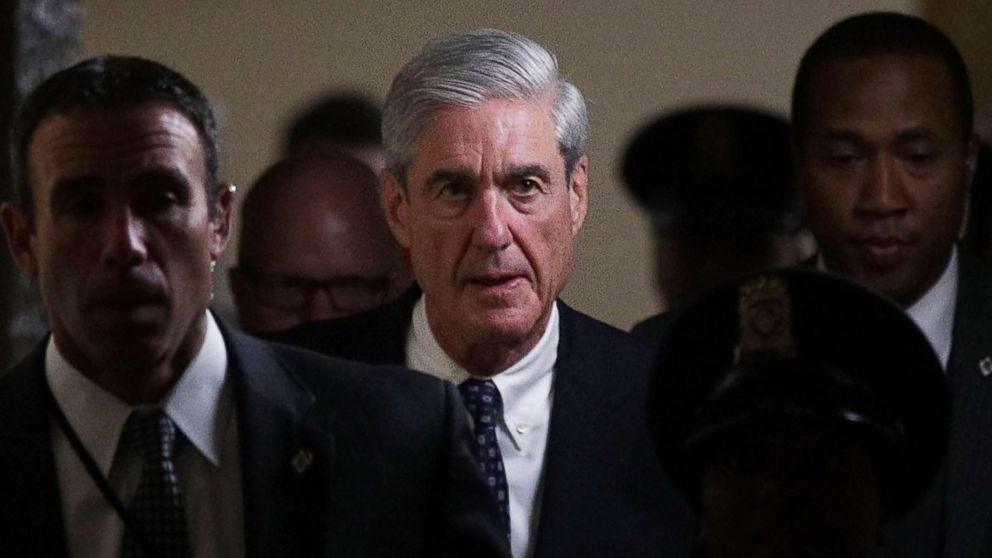ANALYSIS: Mueller makes bold first moves, how will Trump respond?
— -- Special counsel Robert Mueller has shown his first cards — and they make statements by themselves. The next move belongs to President Donald Trump, setting up a clash that could reverberate through the rest of his presidency.
On one level, the first action from Mueller’s team produced a narrow pair of indictments, plus a guilty plea by a peripheral Trump campaign player.
Mueller this morning dropped charges on Paul Manafort, Trump’s former campaign manager, and Rick Gates, who served as a top deputy to inauguration chairman Tom Barrack on the 2017 Presidential Inauguration Committee, regarding tax fraud, money laundering and legal violations related to their lobbying business.
Barely an hour later came news of a guilty plea for lying to the FBI by George Papadopoulos, a 30-year-old campaign foreign-policy adviser who has nowhere near the public profile of Manafort or Gates.
The indictment and the guilty plea don’t touch on Trump’s actions.
It doesn’t definitively answer questions of collusion with Russian operatives, though it does start to map out attempted collusion -- the purported purpose of Mueller’s probe in the first place.
Taken as a whole, Mueller, it appears, could be making a series of tactical moves that put the president’s legal team and the president himself on notice that more heat is coming.
It’s important to realize who Manafort and Gates were in the Trump orbit, and what was going on during the critical period during which they held leadership roles.
Manafort took over the campaign to help navigate a convention that Trump had every reason to think would be contested — an insider’s insider meant to bring discipline and planning to a haphazard operation.
He was at the helm at a time that — as has been established by Donald Trump Jr.’s emails — the Trump inner circle was seeking information on Hillary Clinton they thought was being peddled by Russian operatives.
While the convention wound up not being contested, Manafort and Gates ran the event in Cleveland, where changes to the Republican Party platform were muscled through softening language on Russia’s incursion into Ukraine.
Gates stayed on the campaign long after Manafort was fired, in late August 2016. He took on roles planning the inauguration and running a Trump-backing non-profit that aims to boost the president’s policy agenda — leaving him in close contact with virtually everyone in the Trump White House and broader Trump-land orbits.
Mueller’s team will surely want to know more about their conversations with other members of the Trump inner circle — including the president’s sons and son-in-law — now with the threat of prison time hanging over Manafort and Gates. Mueller is showing he means business, and knows what pressure points to squeeze.
As for Papadopoulos, his guilty plea is for lying to special agents “about the timing, extent and the nature of his relationships with certain foreign nationals whom he understood to have close connections with senior Russian government officials.”
That’s a pretty big tell about where else Mueller might be heading. And documents made public today show Padadopoulos is now cooperating with investigators about meeting he sought to set up, among other matters.
As laid out in today’s guilty plea, Papadopoulos pressed for months for candidate Trump to meet with senior Russian officials — a push that apparently went nowhere. But the guilty plea says Papadopoulos was “encouraged” to go to Moscow by a campaign supervisor who was not named today and plays out monthslong communications between Papadopoulos and Russian officials.
There are other big messages for the White House and Trump associates in Mueller’s round one.
He’s going deep into business finances from a period that far predates the campaign to produce evidence against Manafort and Gates. Intriguingly, he’s going after them for tax evasion — a well-known tactic to get indictments for other wrongdoing through the back door and a topic that’s particularly sensitive for the president, who has refused to reveal his tax returns.
In July, with speculation swirling that Trump might fire Mueller, two reporters from The New York Times asked him if looking at his personal and family finances would be a “red line” and a “breach of what his actual charge is.” Trump responded, “I would say yeah. I would say yes.”
Trump’s first response to today’s events was a tweet, where he sought to minimize Manafort’s role on the campaign, and put attention back on Hillary Clinton.
“Sorry, but this is years ago, before Paul Manafort was part of the Trump campaign. But why aren't Crooked Hillary & the Dems the focus?????” he tweeted.
“Also, there is NO COLLUSION!” he added.
The Papadopoulos charges suggest otherwise, and Mueller is still working the investigation’s different angles, one can only presume.
As for the president’s next move, unlike typical cases, Trump has the power to remove the special counsel, and pardon those implicated in the probe.
Mueller has taken no small amount of criticism during the months he’s served as special counsel, with partisan operatives up to and including those in the White House questioning his integrity and motives.
Today, Mueller struck back. It may be that did so with the expectation, of a presidential response.




